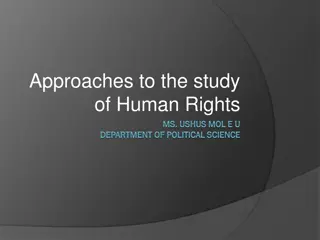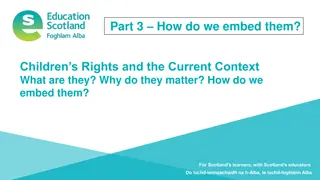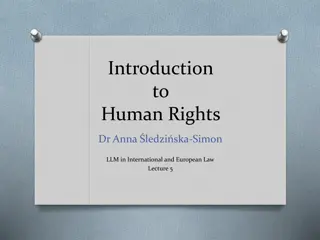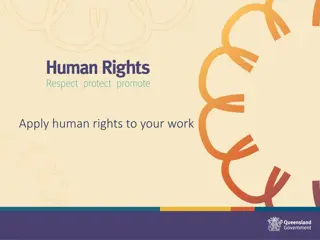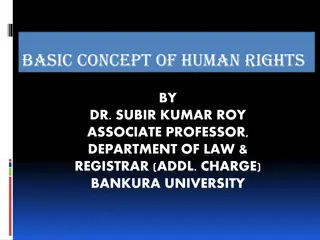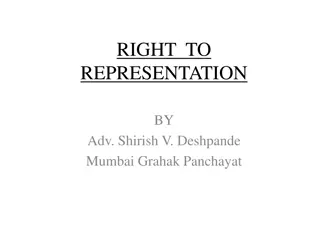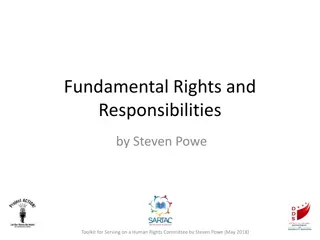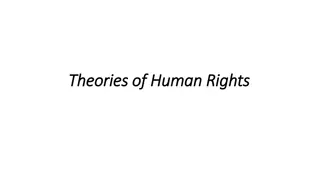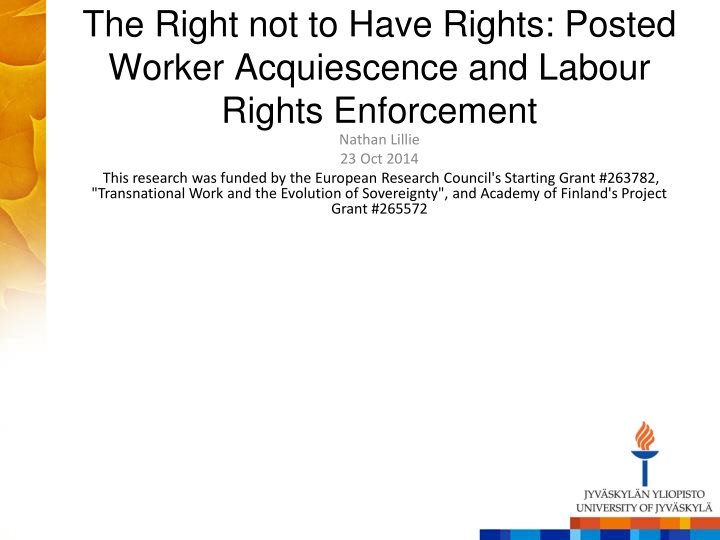
Worker Rights and Transnational Labor Issues
Explore the impact of posted workers on labor rights enforcement and the evolution of sovereignty in transnational work settings. This research delves into the policy problems of posted work, the changing relationship between states and citizens, and the variegated sovereignty affecting workers based on their employer's origin.
Download Presentation

Please find below an Image/Link to download the presentation.
The content on the website is provided AS IS for your information and personal use only. It may not be sold, licensed, or shared on other websites without obtaining consent from the author. If you encounter any issues during the download, it is possible that the publisher has removed the file from their server.
You are allowed to download the files provided on this website for personal or commercial use, subject to the condition that they are used lawfully. All files are the property of their respective owners.
The content on the website is provided AS IS for your information and personal use only. It may not be sold, licensed, or shared on other websites without obtaining consent from the author.
E N D
Presentation Transcript
The Right not to Have Rights: Posted Worker Acquiescence and Labour Rights Enforcement Nathan Lillie 23 Oct 2014 This research was funded by the European Research Council's Starting Grant #263782, "Transnational Work and the Evolution of Sovereignty", and Academy of Finland's Project Grant #265572
| 2 Transnational Work and the Evoluation of Sovereignty." Nathan Lillie TWES
| 3 Policy Problem of Posted Work Posted work: when a company sends an employee abroad to work Home country conditions - EU free movement Workers in same physical space have different rights based on nationality of employer Nathan Lillie TWES
| 4 Core Question How does transnational work and the regulation around it change the relationship between states and citizens? Nathan Lillie TWES
| 5 Variegated sovereignty spatial fragmentation of regulation: i.e. treating people differently based on status in this case the origin of their employer Ong (2006) Neoliberalism as exception: mutations in citizenship and sovereignty, p. 7 Nathan Lillie TWES
| 6 Case Study Analysis 4 countries: Germany, UK, Finland, Netherlands Interviews with posted workers Management subcontracting strategy and industrial relations Working conditions and positions in contracting chain Individual migration strategies of workers Union regulatory strategies Relations between migrant and native workers Nathan Lillie TWES
| 7 Policy Interviews and text analysis EU actors role: employer and unions associations, EU bureaucracies, politicians Articulation between national actors and EU associations Articulation into practice of EU political outcomes Relationship between firm practice and formal institutional change Nathan Lillie TWES
We went to the work site ... and there were some Estonian workers, that were posted workers, and we asked ... what their salary was. Their foreman, who spoke Finnish, said that everyone of them got 10 euros per hour. After that we checked the contract between the client company and the employer, which was an Estonian company and it said that some of the workers were being billed at 10 euros per hour and some 7 euros. So basically, what the contractor was billing the client for the workers was less than what the workers said they were being paid. When workers and employers do that kind of cash in hand deal, and say that the working conditions are other than what they are, then we are in practice pretty toothless, that is we don t really have any tools to do anything, if the people concerned are of the opinion that everything is ok. (Finnish labour inspector)
Hobbesian Bargain The right to have rights hinges on membership in a particular community, in practice a particular nation state (Arendt 1976) Workers choose be posted or look for work in host countries themselves, implicit (coerced) bargain that rights will not be evoked. Employability depends on agreeing not to have rights Bargain is necessity opaque, implicit, and informal, leading to semi-legal and illegal operation
theoretical right to freely engage in contracts of employment, they cannot usually enforce these contracts; post-hoc revision by employers, or exploitation of unclarities epidemic of wage theft
Enforcement of CBAs and labour laws made difficult So every time you have to figure out exactly what is the law that applies to this person. You know, does he have a Dutch contract? Does he have a Polish contract or a Romanian contract? Is he even under EU law? And that makes it almost impossible for us to really organize these people.
Settled in mobility and insecurity migrant labour market and trade union experiences in an enlarged EU (Berntsen, PhD thesis 2015) the common pragmatic response of [posted] workers to substandard employment is to either accept these conditions or to move on to a better job opportunity, they avoid challenging the way cross-border employment is organized and instead contribute to the continuation of current labour relations. (Berntsen 2015, based on interviews with posted construction workers in Netherlands)
Laval Quartet C-341/05 Laval un Partneri [2007] ECR I- 11767 C-346/06 R ffert [2008] ECR I-1989 C-319/06 Commission vs Luxembourg [2008] ECR I-4323 C-438/05 The International Transport Workers Federation and The Finnish Seamen s Union [2007] ECR I-10779 C-396/13 S hk alojen ammattiliitto ry [2015]
C-396/13 Shkalojen ammattiliitto ry v. Elektrobudowa Sp ka Akcyjna [2015] CJEU reference from Satakunta labour court Questions: Right of union to represent Polish workers in court? application of CBA pay scales and application of supplementary payments and allowances to the minimum wage?
How are posted workers represented/protected in Europe? Via membership in home country unions - never actually happens Via membership in host country unions Not usually members, and if so it is only for short term, usually instrumental when seeking legal aid Organizing active strategies to go to worksites and convince workers to join Mobilizing involvement via participation in some union action (strike) Alternatively, solidaristic secondary action by host country workers can be effective Labour inspection Autonomous organization - networks, wildcat strikes main contractor liability (and public contracting standards)
What does EU law allow? Via home country unions - was pushed in the Laval case But usually no capacity or inclination to do this Via host country unions - the major way they have standards enforced but limited to PWD directive and legal extension, practice often unclear but enforcement of wage standards for PWs limited to extended agreements and minimum wages Organizing Resource intensive, requires ideology, appropriate union structure Mobilizing Hard to do Secondary action not permitted in most countries or situations Labour inspection (potentially) constrained by Enforcement Directive Own organization - hard to do and rarely turns out well main contractor liability, (potentially) constrained by Enforcement Directive Public contracting standards prohibited by R ffert decision
Extension Mechanism Shop floor union structures Strong in domestic firms Main Contractor Liability weak Labour Inspection Legal extension of industry CBAs subordinate to union strategy Finland no CBAs minimum wage None weak via works councils none strong weak Criminal law oriented Estonia Germany Legal extension of industry CBAs CBA extended site-by-site weak but unions seek to improve medium Fragmented Netherlands Strong none No data United Kingdom NOTE: ONLY INVOLVES THE SITES WE RESEARCHED (INDUSTRIAL CONSTRUCTION)
EASI project Posting of Workers: enhancing administrative cooperation and access to information EU Commission DG EMPL funded project Project goal is to strengthen worker protection and union rights for posted workers in the new environment We will summarize and apply lessons from the research, and experiences of practitioners, to develop best practices in cooperation with labour inspectors, trade unionists and other stakeholders. Workshops: Bryssel, Helsinki, Padova, Wien, Oslo, Praha
Partners Uni Tampere (Markku Sippola) Multicultural Centre Prague (NGO) EFBWW (European Federation of Building and Woodworkers) EFFAT (European Federation of Food, Agricultural and Tourism Workers) Czech Labour Inspection JyU (coodinator) DG EMPLOY (funder) Uni Padua FORBA, Vienna SOLIDAR (NGO, Bryssel) FAFO tutkimusinstituutti, Oslo Suomalainen ty suojeluvirasto Italian labour inspection Austrian labour inspection

